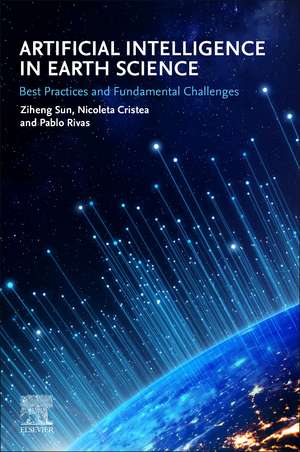Artificial Intelligence in Earth Science: Best Practices and Fundamental Challenges
Editat de Ziheng Sun, Nicoleta Cristea, Pablo Rivasen Limba Engleză Paperback – 25 apr 2023
The book tackles the complexity of Earth system problems in AI engineering, fully guiding geoscientists who are planning to implement AI in their daily work.
- Provides practical, step-by-step guides for Earth Scientists who are interested in implementing AI techniques in their work
- Features case studies to show real-world examples of techniques described in the book
- Includes additional elements to help readers who are new to AI, including end-of-chapter, key concept bulleted lists that concisely cover key concepts in the chapter
Preț: 829.51 lei
Preț vechi: 1084.24 lei
-23% Nou
Puncte Express: 1244
Preț estimativ în valută:
158.75€ • 165.30$ • 134.16£
158.75€ • 165.30$ • 134.16£
Carte tipărită la comandă
Livrare economică 04-18 martie
Livrare express 01-07 februarie pentru 100.33 lei
Preluare comenzi: 021 569.72.76
Specificații
ISBN-13: 9780323917377
ISBN-10: 0323917372
Pagini: 430
Dimensiuni: 191 x 235 x 24 mm
Greutate: 0.74 kg
Editura: ELSEVIER SCIENCE
ISBN-10: 0323917372
Pagini: 430
Dimensiuni: 191 x 235 x 24 mm
Greutate: 0.74 kg
Editura: ELSEVIER SCIENCE
Public țintă
Researchers and professionals across Earth Science branches including geology, remote sensing, climate science, atmospheric science, agriculture, oceanography, etc.Cuprins
1. Introduction of artificial intelligence in Earth sciences
2. Machine learning for snow cover mapping
3. AI for sea ice forecasting
4. Deep learning for ocean mesoscale eddy detection
5. Artificial intelligence for plant disease recognition
6. Spatiotemporal attention ConvLSTM networks for predicting and physically interpreting wildfire spread
7. AI for physics-inspired hydrology modeling
8. Theory of spatiotemporal deep analogs and their application to solar forecasting
9. AI for improving ozone forecasting
10. AI for monitoring power plant emissions from space
11. AI for shrubland identification and mapping
12. Explainable AI for understanding ML-derived vegetation products
13. Satellite image classification using quantum machine learning
14. Provenance in earth AI
15. AI ethics for earth sciences
2. Machine learning for snow cover mapping
3. AI for sea ice forecasting
4. Deep learning for ocean mesoscale eddy detection
5. Artificial intelligence for plant disease recognition
6. Spatiotemporal attention ConvLSTM networks for predicting and physically interpreting wildfire spread
7. AI for physics-inspired hydrology modeling
8. Theory of spatiotemporal deep analogs and their application to solar forecasting
9. AI for improving ozone forecasting
10. AI for monitoring power plant emissions from space
11. AI for shrubland identification and mapping
12. Explainable AI for understanding ML-derived vegetation products
13. Satellite image classification using quantum machine learning
14. Provenance in earth AI
15. AI ethics for earth sciences
